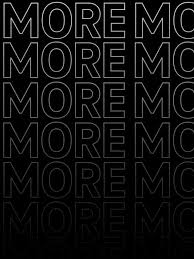Sellers tend to be selfish and greedy. They keep asking for “More!” The need for more pretty much permeates everything sellers and managers do.
More pretty much runs the gamut of topics—more leads, more opportunities, more scripts, more content, more support, more tools, more deals, more pipeline, more calls, more meetings, more proposals, more discounts. more product to sell, more territory, more pipeline, more commission, more people, more funding, more, more, more….
And the response to these request is, generally, to provide more. Though more seldom equates to better, and, in my experience, is never the right starting point for improvement.
In some ways, it’s easy to understand, when people are held accountable for activities, or quantities, more may seem like a way to meet these goals.
It’s strange, when faced with request for more, people seldom do a deep dive into, “Why?” Or, “How do you do better with what you have?”
These questions require too much work, too much understanding and analysis. It requires us to actually diagnose why things aren’t working. It requires us to figure out how to change or improve it.
Think about it, we constantly ask marketing for more leads! And generally, they give us more. Or we ask our people for more dials, calls, emails. And the technology enables them to do an unlimited number of these. Yet results don’t change, or they don’t change in the way we would expect them to change.
For example, it’s not unreasonable to think that if I double the volume of anything, I should be able to double the volume of the outcome. But, instead, it tends to result in diminishing returns.
What if we started resisting the request for more, rather asking “Why do you need more?”
One could imagine the following conversation:
Salesperson: “I need more leads!”
Manager: “Why do you need more leads?”
Salesperson: “Stop wasting my time with questions, just give me more leads?”
Manager: “Humor me, why do you need more leads?”
Salesperson: “OK, I’m not finding enough opportunities, my pipeline sucks! You want me to build more pipeline….”
Manager: “OK, my fault, we should have looked at that more carefully. Are you chasing the right opportunities?”
Salesperson, frustrated: “I don’t have the time to figure that out! I just need to fill my pipeline! I need more!”
Manager: “If you took the time to figure out whether you are chasing the right opportunities, you might see that you don’t need more, you need different. You need leads focused on our ICP and qualifying deals where those customers have a high urgency for changing. If you did that, you might have enough…..”
Salesperson: “Don’t pull all that ICP, change urgency, and qualification crap on me, I just need more, I’ll close what I can!”
Manager: “That’s a good point. What’s your win rate? What’s your deal size? What’s your sales cycle? If you improved your win rate, you may not need more, if you chased bigger deals, you may not need more. Have you looked at what it takes to improve your win rate, BTW, I just looked, your win rate is less than 15%. If you doubled your win rate, you would only need half the opportunities you currently need? What does it take for you to double your win rate?”
Salesperson, feeling hopeless: “I don’t have the time to do this, I just need more….”
Manager: “That’s another good point. You are spending 12 hours a day just dealing with what you have now, between following up on the leads you currently get, working the deals in your pipeline, and so forth, how will you find the time to handle more leads?”
Salesperson, defeated: “Please, we’ve wasted enough time, I don’t have the time to figure it out. I’ll just fit the additional leads into my current workload, I’ll spend less time managing my pipeline, focusing more time on the additional leads…..”
You can see that unchallenged, more generally creates a death spiral.
In this scenario, the salesperson is the heavy, but the manager shares as much responsibility for this problem as the sales person. The manager should have been looking at these issues with the sales person, coaching them to maximize their ability to produce results with what they have. Only when they have done that and are getting the most of what they have, does it make sense to ask for more.
Fault lies across the organization, with marketing and marketing management, with sales people and sales management, with everyone who has an impact on the organization’s ability to perform and produce results.
Before we ever do more, on anything, we have to first challenge ourselves, “are we getting the most out of what we are currently doing? Are we getting the most out of each lead, are we getting the most out of each qualified opportunity, are our tools enabling us to produce the results they should…..”
If we continue to blindly respond to requests for more, we are more likely squandering opportunity, resources, and wasting time.
Responding with more is irresponsible until we thoroughly understand that we are getting the most out of what we currently have.
So let’s stop asking for more, let’s just do much better!
Afterword: For the “consultants” and “researchers,” we need to do a better job in helping understand this constant demand for more. This diatribe was the result of reading a research report. A key conclusion was, “Sales people are asking for more leads….” Well dugghhh, we don’t need research to tell us that. If your research responses show this, ask, “Why?” Drill down and ask, “What are you getting with what you have?” This is more insightful and helpful than reporting that sales people want more leads…..

Leave a Reply